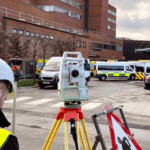Managing the groundworks phase of a project can seem quite daunting. Usually, one of the largest works packages on a construction project, there are many variables, risks and opportunities to evaluate in the groundworks phase. In this blog we delve into the essential components that contribute to the success of a groundworks project, highlighting the critical role of early engagement, effective communication, comprehensive planning, teamwork culture, and continuous evaluation.
1. Early Engagement with Your Groundworks Contractor
The foundation of a successful groundworks project is laid long before the first shovel hits the ground. Early engagement with the chosen groundworks contractor fosters a deeper understanding of project requirements, constraints, and objectives. This enables the contractor to provide valuable insights, offer innovative solutions, and align their expertise with the project’s vision. Collaborative discussions at this stage facilitate the identification and mitigation of potential risks, ensuring a smoother journey from conception to completion.
2. Regular Coordination Meetings with All Stakeholders at Pre-construction Stage
Communication is the cornerstone of effective project management. Regular coordination meetings involving all stakeholders, especially the design teams, are imperative during the pre-construction stage. These meetings serve as forums for exchanging ideas, clarifying expectations, and resolving any discrepancies in the project plans. By fostering a collaborative environment early on, teams can proactively address challenges, streamline processes, and align their efforts towards achieving common goals.
3. A Clear Comprehensive Programme and Logistics Plan for Each Phase of the Groundworks Project
Clarity breeds efficiency. A well-defined programme and logistics plan will communicate the sequence of activities, resource allocation, and timelines for each phase of the project. This roadmap serves as a guiding framework, allowing stakeholders to anticipate potential bottlenecks, allocate resources effectively, and maintain momentum throughout the project. Moreover, a clear plan enhances transparency, enabling stakeholders to track progress, identify and overcome challenges, and make informed decisions in a timely manner.
4. Promote a Teamwork Culture on Site Where Everyone is Engaged
‘Teamwork makes the dream work’. Success is a collective endeavor. Fostering a teamwork culture on-site cultivates a sense of ownership, accountability, and mutual respect among all project participants. Encouraging open honest communication, collaboration, and knowledge sharing empowers individuals to contribute their expertise, address challenges collectively, and strive towards shared objectives. By nurturing a supportive work environment where every voice is valued, teams can unleash their full potential and overcome obstacles with resilience and unity.
5. Regular Coordination Meetings with All Subcontractors and Designers to Measure Progress and Address Challenges
Continuous evaluation is paramount to project success. Regular coordination meetings with subcontractors and designers provide a platform for assessing progress, identifying emerging issues, and implementing corrective measures proactively. By fostering ongoing dialogue and collaboration, stakeholders can adapt to changing circumstances, mitigate risks, and optimize project outcomes. Furthermore, these meetings reinforce accountability, ensuring that all parties remain aligned with project milestones and deliverables.
6. Celebrate Successes with the Team Throughout the Project and at Handover
Recognition fuels motivation. Celebrating successes, both big and small, fosters a culture of appreciation, camaraderie, and pride among project teams. Whether it’s achieving key milestones, overcoming significant challenges, or delivering exceptional quality, acknowledging and rewarding efforts instills a sense of accomplishment and inspires continued dedication. Moreover, celebrating achievements during project milestones and at handover ceremonies reinforces the collective impact of teamwork, leaving a lasting legacy of excellence and collaboration.
Conclusion:
A successful groundworks project is not merely about the work itself. It’s about prioritizing early engagement, effective communication, comprehensive planning, teamwork culture, continuous evaluation, and celebration of achievements in a way that empowers all stakeholders to carry out their best work. When it’s done well it will all but guarantee a successful groundworks and construction project.




